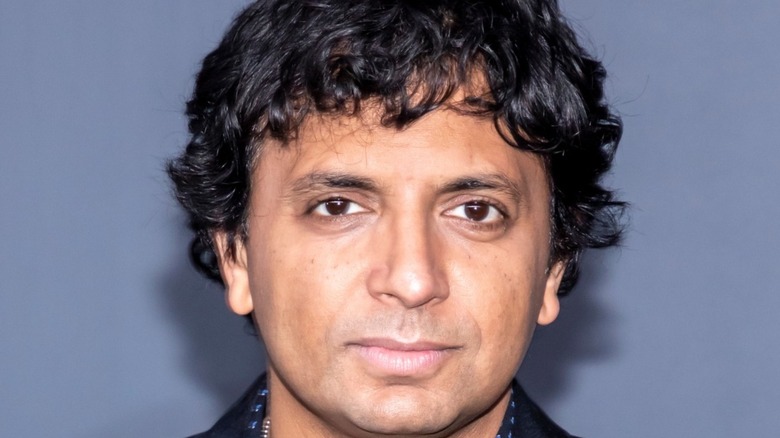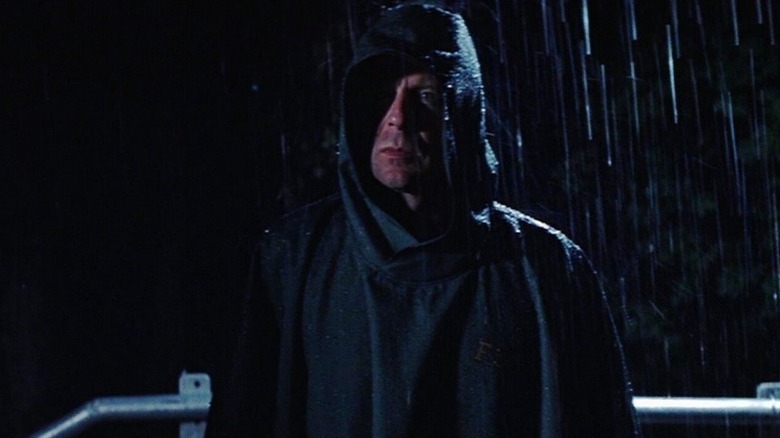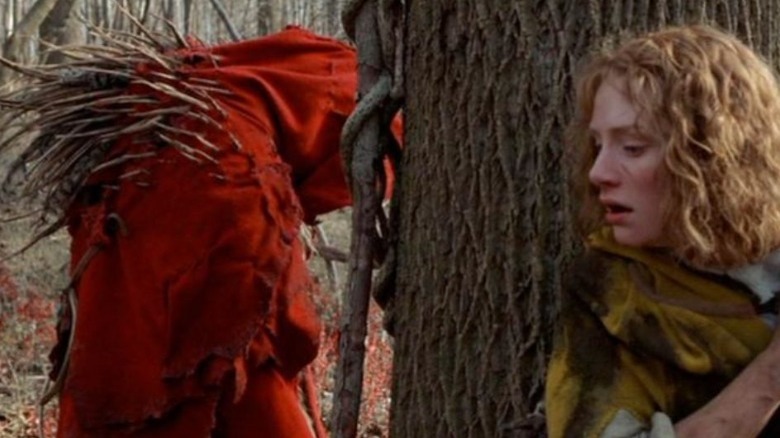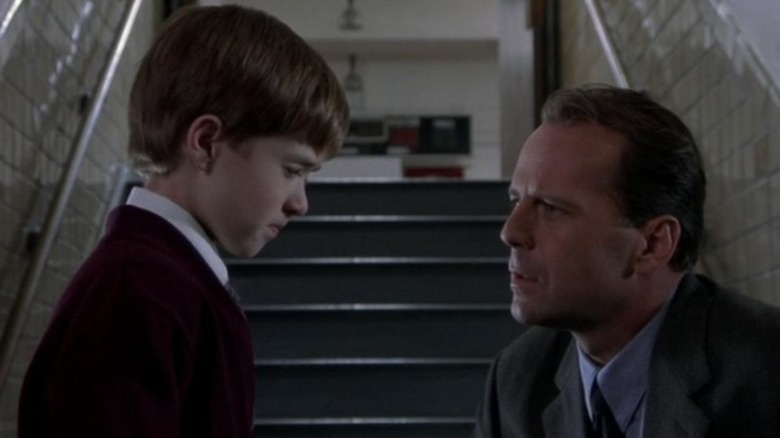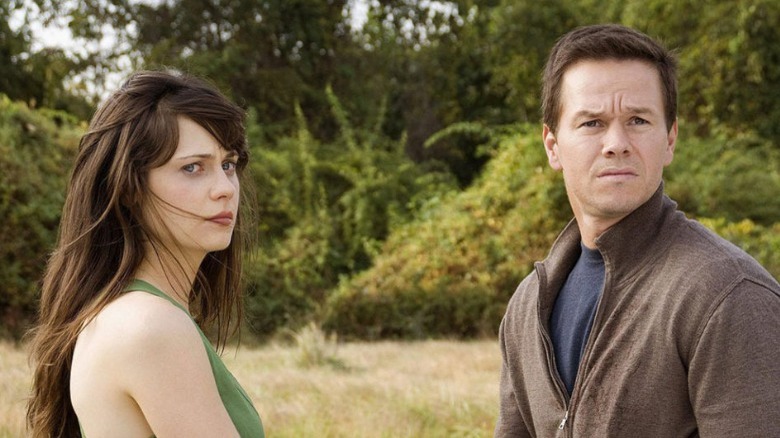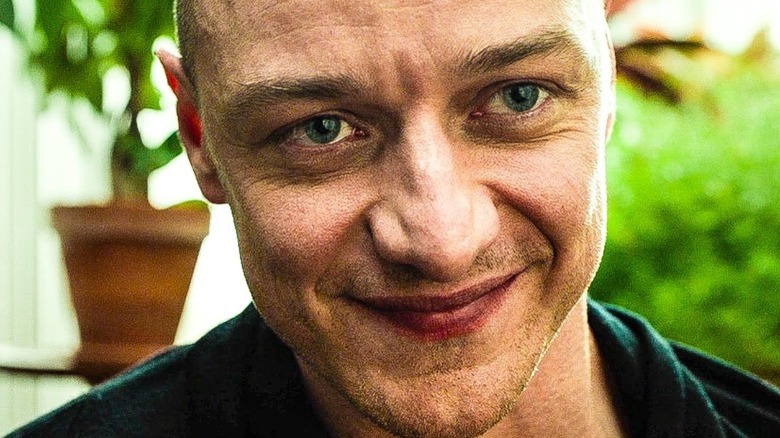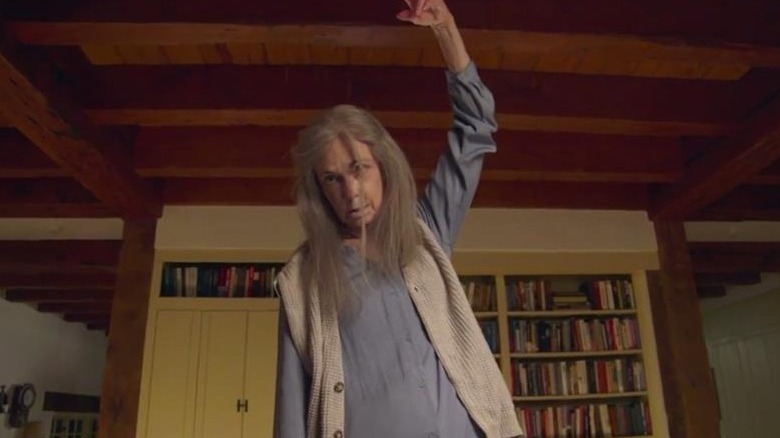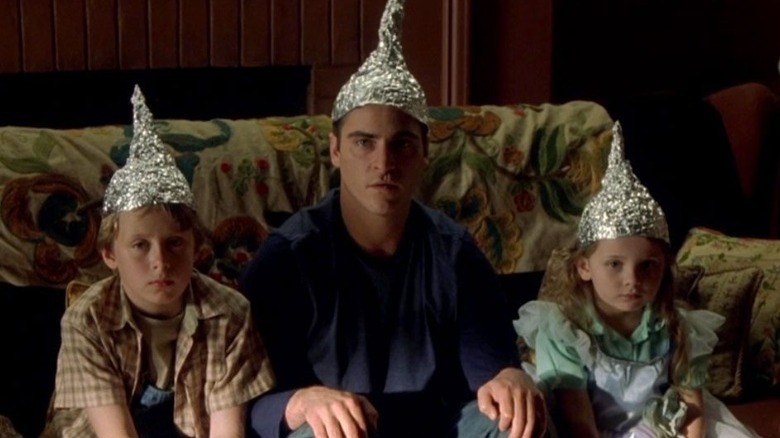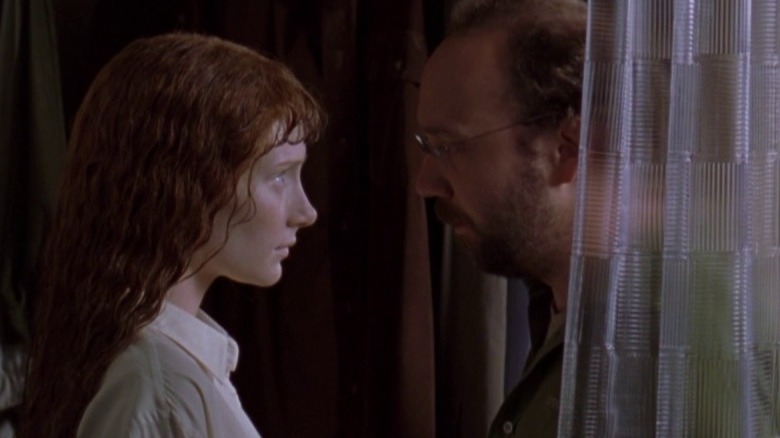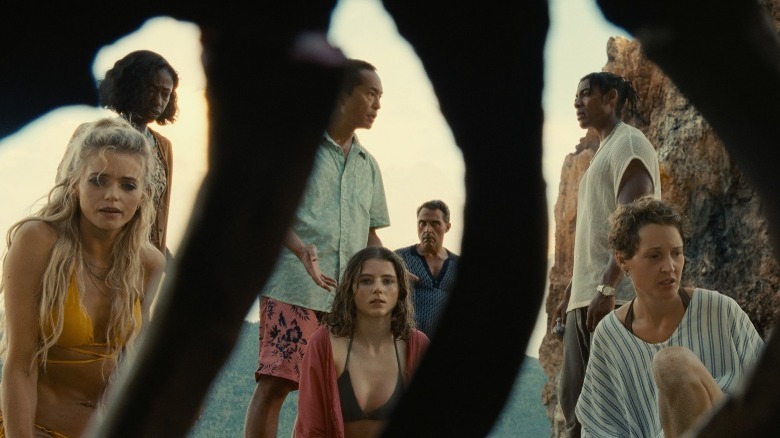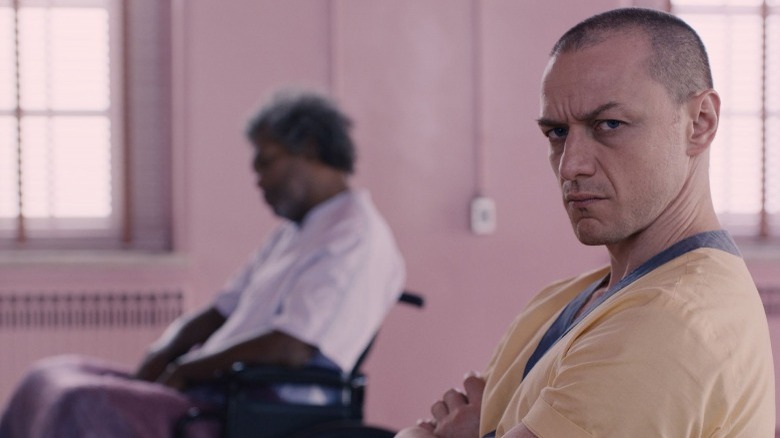M. Night Shyamalan's 5 Best And 5 Worst Reveals
Since the dawn of cinema, it's been proven time and time again that audiences love a good thriller. One that tells a spiraling tale full of mystery and secrets that ultimately leads to heavy revelations meant to shock and amaze. Filmmakers have long attempted the fine art of creating captivating plot twists on the big screen; sometimes they succeed, other times the reveal is utterly predictable — and on certain occasions, the big twist is simply a catastrophic failure. Ultimately, the judge is the audience, who flood theaters far and wide looking for a film meant to deliver the goods.
The art of the plot twist isn't an easy feat to pull off. While the reveal itself must be shocking, a healthy dose of anxiety and burgeoning pensiveness must prelude the eventual revelation in order to hook viewers to the very end. Arguably, creating an unpredictable narrative that synchronizes the beginning and the end masterfully is a difficult task.
M. Night Shyamalan is known for creating strange cinematic stories that have audiences begging to know what the catch is behind seemingly unnatural happenings afoot. A majority of the time, the film director has no problem hooking audiences with a mysterious premise. However, his big climactic plot twists are often hit or miss. When they hit, they're strong and mind-bending. Misses often have us swearing off Shyamalan movies entirely, until we are once again hooked with the next big trailer.
With the obvious warning of serious spoilers ahead for every plot M. Night Shyamalan has ever tried to twist, let's take a look at some of the director's best and worst final acts in his cinematic career.
Best: Unbreakable
Hot off the heels of his spooky blockbuster "The Sixth Sense," Shyamalan jumped into the world of comic books, exploring the themes at play in pages brimming with color and word bubbles. "Unbreakable," however, rarely felt like your average comic book film. Instead, the themes of superheroes and villainy take a backseat to the grounded drama at play in the life of David Dunn (Bruce Willis). The film sets a mystery in motion as David, a college stadium security guard, finds himself in the middle of a devastating and tragic train crash. David is unharmed, however, and walks away without a scratch.
Following the event, an art gallery owner by the name of Elijah Price (Samuel L. Jackson) contacts David to share his own insight into the security guard's miraculous invincibility. David begins to wonder if Elijah has a few screws loose once he reveals himself to be a comic book connoisseur and claims that David is a nearly indestructible superhero. Elijah also shares that he was born with brittle bone disease. He is easily bruised and injured as a result. Elijah always believed the universe created someone who was his opposite, with magnitudes of strength that rendered him "unbreakable."
David dismisses Elijah's ramblings as delusions. The film then takes a riveting turn when David begins to realize that he can sense criminal intent by simply touching an individual. David embraces his superhero qualities to save innocents. However, the biggest revelation comes when he finally touches Elijah in the end and realizes the comic book fanboy orchestrated countless tragic accidents, including David's train wreck, in an effort to find his opposite. Claiming the moniker of Mr. Glass, Elijah embraces the idea that he is a villain. Who would have thought weakened Elijah could be a crazed mass murderer?
Worst: The Village
By the time "The Village" hit theaters, Shyamalan's predilection for supplying audiences with the ultimate shock was now a calling card forever associated with the director. As many would come to learn, however, not every plot diversion or narrative twist satisfies viewers, even if it has utilized its unpredictability. "The Village" told the story of a 19th century village called Covington in rural Pennsylvania. The entire town is surrounded by stretches of woodlands.
The townsfolk don't tread into the woods, as they know mysterious creatures inhabit the area. There's a longstanding agreement between the village leaders and the spooky creatures in the forest; if the good folks of Covington don't enter the woods, the creatures won't come down into the village to terrorize the locals. One of the locals, Lucius Hunt (Joaquin Phoenix) desires to journey outside of the village to neighboring towns in an effort to procure medical supplies for the community. His request to do so is denied by the leaders and his own family who criticize the wicked neighboring towns and the potential for peril within the woods. At one point, Lucius enters the woods to see what the fuss is all about. The creatures head to the village and leave red warning markers on their doors for the breach in the agreement.
In a moment of desperation, Ivy Walker (Bryce Dallas Howard) traverses the woodlands to find medical supplies for Lucius after he had been stabbed by a local. What she finds is a paved road with automobiles and modern civilization unveiling the fact that the village leaders have created a secluded village and kept the locals inside through fear tactics. The mystery and suspense behind the legends and what it meant for Ivy as she plunged into the forest was captivating. The reveal, however, was anti-climactic and quite dull.
Best: The Sixth Sense
In the realm of psychological horror, "The Sixth Sense" stands supreme as a master craft in storytelling and subverting expectations not simply for shock value, but to bolster the themes behind the narrative of achieving closure and humanity's desire to fulfill a purpose. In Bruce Willis's first of several experiences working with M. Night Shyamalan, he plays the role of a child psychologist by the name of Malcolm Crowe. In the beginning moments of the film, Malcolm is shot by a former patient who claims Malcolm was unsuccessful in treating him and that he still had hallucinations in his adult years.
Later, Malcolm is seen some time after the event, taking on a new patient by the name of Cole Sear (Haley Joel Osment). Cole is troubled by his own fears and inability to cope with bullying at school. He eventually confides in Malcolm and reveals that he can see the apparitions of dead people walking around in limbo believing they are still alive. Malcolm suggests that the young boy should try to find a way to help the spirits he does see have some peace. Perhaps, there is unfinished business that they must complete.
Ironically, we learn that Malcolm is one of those undead spirits. He finally realizes that he never survived the gunshot wound he received from his former patient and that his entire experience with Cole was Malcolm seeking to overcome his failure. It's a gripping conclusion that sees Malcolm find peace once again.
Worst: The Happening
In perhaps one of the most disappointing revelations of the Shyamalan oeuvre, "The Happening" made bold promises that it simply couldn't deliver. The premise was bizarre, with trailers that were begging audiences to come see the hidden secret, one that seemingly caused mass groups of people across the country to inexplicably commit mass suicide.
Sweeping across regions of the United States, the phenomena resulting in humans ending their own lives in an apparent mental breakdown was perceived by many early on as a bio-terrorist event. The film followed Elliot (Mark Wahlberg) and Alma Moore (Zooey Deschanel), a married couple attempting to flee an invisible, self-destructive agent apparently carried by the wind. Early in the film, a farmer suggests that plants have created a defense mechanism materializing as an airborne toxin that ultimately causes humans to kill themselves unwillingly. In the end, the big reveal was that the farmer's theory was actually true.
Many audiences likely brushed off the absurd ramblings of the man — surely there must be something more intriguing at play. But when the truth was revealed, the film's perplexing narrative took an unintended comedic turn, presenting an element of camp akin to sci-fi horror films of the '60s and '70s. Although some have come around to appreciate the film for what it is, the release of "The Happening" drew the ire of fans and critics.
Best: Split
Following a string of critical and box-office failures with "Lady in the Water," "The Happening," "The Last Airbender," and "After Earth," Shyamalan needed to buy himself some goodwill with audiences. "Split" was his ticket to do just that.
Heading back into psychological horror territory, the film centered around Kevin Wendell Crumb (James McAvoy), a man afflicted with dissociative identity disorder. The condition was a coping mechanism for massive childhood trauma stemming from abuse and neglect. Within Kevin's psyche were 23 individual personalities with their own names, genders, and ideas. The most feared personality was simply known as "the beast," an embodiment of rage who seeks to rid the world of those he has deemed impure — those who have lived a cozy life and have never truly suffered.
Kevin's personalities kidnap and imprison four girls — one of which, Casey (Anya Taylor-Joy), is an outcast and doesn't typically associate with the others. Kevin shares with the group that he is saving them for the beast. After many attempts to escape, the beast comes for the girls and feeds on them. Casey is the only one able to escape and, after she desperately fights to stay alive, the beast sees up close that Casey has many physical scars from her abusive family. He realizes she has suffered and states that "the broken are more evolved." Sparing her, he flees into the city and is dubbed "The Horde" by the press after his crimes go public.
The film then reveals this story took place in the same world as "Unbreakable," when David (Bruce Willis) is seen sitting at a diner and taking in the news report of The Horde. The idea of Shyamalan's first universe being built off one of his best films was a thrilling revelation for fans of both films.
Worst: The Visit
Shyamalan is known for producing films that are often overly serious and fairly melodramatic. However, the director changed gears with "The Visit," framed as a mysterious horror film of the famous found-footage subgenre. But what audiences were treated to instead was a bit of levity in the form of a comedy horror. The film may have one of the worst reveals in Shyamalan's catalogue, but it's still a fun watch for fans that enjoy a humorously disturbed horror film.
"The Visit" follows Becca (Olivia DeJonge) and her younger brother Tyler (Ed Oxenbould), two children of single mother Loretta (Kathryn Hahn). Their mother heads off on a cruise with her boyfriend while Becca and Tyler are sent to stay with their grandparents. The catch, however, is that Loretta hasn't spoken to her grandparents in several years and her children have never met them. After "Nana" (Deanna Dunagan) and "Pop Pop" (Peter McRobbie) pick up the kids from the train station, the kids document everything via their camcorder. In a rural farm house, the grandparents instruct the grandchildren to never go downstairs due to the mold and to be in bed at 9:30 every night.
Quickly, the kids begin witnessing strange, frightening behavior from the elderly couple including odd nightly activities post-curfew, vomiting, shaking, and screaming. Tyler finds feces and diapers in the shed, and a visitor seemingly disappears. Finally, after speaking with their mother and showing her images of the crazed older couple, she tells the kids that those people are not her parents. The bodies of their actual grandparents are in the basement, and the two posing as Nana and Pop Pop are escaped mental patients — an unfortunate reveal many saw coming a mile away,=, given the odd, suspicious conceit that the kids had never seen a picture of their grandparents.
Best: Signs
"Signs" fed off paranoia that has existed for decades over the unknown as it relates to visitors from outer space. The film was a critical and box office success, built with imagery so eerie that it'd make the hair on the back of your neck stand on end — which we can all thank the Brazilian birthday party footage for.
A farmer and former priest named Graham Hess (Mel Gibson) found himself at the center of a coordinated plan by otherworldly beings to invade, with a young son and even younger daughter, as well as his brother Merrill (Joaquin Phoenix) helping around the farm. The film focuses on Graham's loss of faith after the death of his wife in an automobile accident several months prior. The lasting effect of that moment is seen on Graham's sullen temperament.
After crop circles appear in the fields, and the farm is stalked by a shadowy figure, Graham and Merrill eventually learn that they have to prepare for an alien invasion. They find out these aliens disperse toxic gas and can be harmed by water. Ironically, the family is perfectly suited to deal with these extraterrestrials: Merrill is a former baseball player, Graham's son is an asthmatic, and his youngest daughter is a germaphobe who leaves cups of water all over the house.
With Graham's son having an asthma attack, his airway is closed to the potential toxins. Additionally, Merrill uses his bat — conveniently mounted on the wall nearby — to hit the glasses of water at the alien, killing the creature. This string of perfectly aligned protections enabled Graham to reclaim his faith in the final moments of the film.
Worst: Lady in the Water
"Lady in the Water" came at a time when audiences were primed for a strange premise from Shyamalan, expecting it to result in another fun, out-of-left-field revelation. But instead, this film doubled-down on "The Happening," further disappointing audiences with an absurd narrative that you didn't want to see twist so much as you just wanted it to stop.
The film followed apartment manager Cleveland Heep (Paul Giamatti), rescued by a mysterious girl from the swimming pool after injuring himself and falling in. The girl, named Story (Bryce Dallas Howard), is a narf, a fairy tale creature seeking to awaken a vessel who will better the world from his or her newfound enlightenment. A scrunt, a grass-covered red-eyed wolf, is hunting the narf. Cleveland must learn more about the fairy tale in order to help Story complete her objective and return home on the wings of a giant eagle.
Ultimately, the story is what it is on the surface, and there are none of the major plot revelations Shyamalan is famous for — the twist, it seems, is that there wasn't one. The reveals come instead as Cleveland and individual tenants in his apartment complex are shown to be chosen helpers with abilities to aid Story in her cause. The film was critically panned for taking wild leaps into fantasy that critics felt were unearned given the film's everyday setting of an apartment complex. Some critics took umbrage with the idea that Shyamalan cast himself as the foretold visionary (vessel) who'd inspire great things through his writing while boldly realizing on screen the misgivings and death of a contemptuous film critic in the apartment complex. Whatever Shyamalan's intent may have been, the film never quite landed with audiences.
Best: Old
Shyamalan headed back to his roots of mysterious tales and crazy reveals with 2021's "Old," which followed characters played by Gael Garcia Bernal and Vicky Krieps, on vacation with their son and daughter. Headed for divorce, the couple are holding off sharing the bad news with their children until after some time together at a remote resort. There, the manager offers to bus the family to a private beach — and upon arrival, they learn there is another family, two other couples, and an individual rapper searching for his girlfriend.
The crew soon realizes things are amiss when the children start looking noticeably older. They also realize that wounds heal in a matter of seconds, and they can't leave the beach without blacking out. It becomes painfully obvious that the beach is speeding up the aging process for its occupants.
Within a matter of hours, the young children are now young adults. The older adults among the group begin experiencing symptoms of dementia or hearing loss. After a harrowing day at the beach that results in the deaths of everyone with the exception of the Cappa children, who are now middle-aged adults, it's revealed that rare natural elements on the beach are causing the rapid aging and that the resort is a front for a pharmaceutical company who lures individuals to the beach to perform lifetime trials on their medicines within a single a day. The Cappa children blow the whole operation wide open in a satisfying turn of events, going on to live the remainder of their years.
Worst: Glass
"Glass" is the climactic ending to a trilogy of films that began with "Unbreakable." "Split" was a surprise semi-sequel to that film and "Glass" brings all of the characters together in a final act. This film, named after the mastermind Mr. Glass (Samuel L. Jackson) from "Unbreakable," follows a confrontation between The Horde (James McAvoy) and David (Bruce Willis). The two are eventually detained and held within the same psychiatric hospital as Elijah (a.k.a. Mr. Glass). Dr. Ellie Staple (Sarah Paulson) oversees the rehabilitation of all three individuals, who she insists falsely believe have superhuman abilities.
Mr. Glass, being the conniving mastermind that he is, makes a play at escaping with the help of The Beast and David through trickery and deceit. The end result is a clash in the parking lot of the hospital, which ultimately results in the deaths of all three individuals. Joseph (Spencer Treat Clark), David's son and Casey (Anya Taylor-Joy) witnessed the entire debacle and had always insisted that superhuman abilities do, in fact, exist. Staple then reveals herself to be part of a clandestine government agency attempting to squash superhumans and keep their reality a secret from the public. Joseph and Casey, however, use the security footage of the hospital parking lot to go public with the truth about superhumans, much to Staple's dismay.
The reality that superhuman abilities exist in this universe was already well established with the critical hit films "Unbreakable" and "Split." An attempt to gaslight audiences into a potential psychiatric explanation was futile, and the admittance of superhuman existence in the final act of the film felt like a retread, telling audiences what they already knew. Unfortunately, this tale of Mr. Glass wasn't the critical darling that its two predecessors were.
